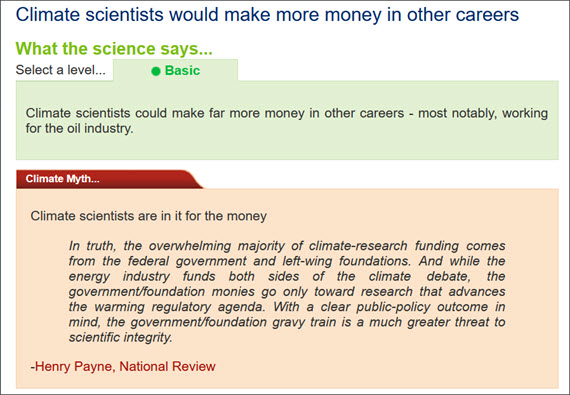
On February 14, 2023 we announced our Rebuttal Update Project. This included an ask for feedback about the added "At a glance" section in the updated basic rebuttal versions. This weekly blog post series highlights this new section of one of the updated basic rebuttal versions and serves as a "bump" for our ask. This week features "Climate scientists could make more money in other careers". More will follow in the upcoming weeks. Please follow the Further Reading link at the bottom to read the full rebuttal and to join the discussion in the comment thread there.
Some branches of science potter along on their own, under the radar. That's because their progress, important as it is, does not have wide-reaching socio-economic consequences. The only arguments you might find between those working in them will be encountered if you go to their conferences or read their publications.
Not so climate science! It has joined a list of scientific topics that one can file under, "Political Footballs". Such politicisation of climate science happened primarily due to a perceived threat to corporate profits. This perception germinated in the 1980s and early 1990s, when it looked as if serious progress might happen in order to tackle the threat of climate change.
Over the years and decades that followed, opposition to climate science became more organised. It involved two key components. Firstly there was the tangled web of corporations, political think-tanks and their public relations associates. These bodies generated, tested and circulated the messages designed to cast doubt on climate science. Secondly there were those politicians and members of the public who bought into and willingly repeated the messages to anyone who would listen.
Once climate science had become politicised, climate scientists became exposed to all sorts of attacks. These included the claim that climate scientists are only in it for the grant-money, implying that scientific research grants represent a financial windfall that the rest of us can only dream of. So let's now dig down into that claim.
Research budgets can be large, huge even, but that does not mean that a scientist can go off and buy a luxury yacht once the grant is awarded. Everything has to be accounted for. Science is expensive to do - very expensive in some cases. A research budget has to cover staff - investigators, field and lab assistants. It has to cover instruments and analyses. It may have to cover the logistics and expenses incurred on data-collecting expeditions. And every dollar of that expenditure has to be set out in detail in the grant application if it is to stand a chance of being accepted. Scientific funding takes place in a highly competitive environment.
In terms of salary, a typical mid-career research scientist works hard for around the same take-home pay to a mid-level IT administrator. There are many much easier ways for an intelligent and literate person to make money. If money was the motive, they'd be in another career. Oil and gas, for example. Most scientists instead do what they do because of its vocational nature. They are motivated to further question the world they live in and its physical properties. In that way, our understanding of the world around us is constantly improving and that's to the ultimate benefit of every single one of us.
Please use this form to provide feedback about this new "At a glance" section. Read a more technical version below or dig deeper via the tabs above!
In case you'd like to explore more of our recently updated rebuttals, here are the links to all of them:
Posted by John Mason on Tuesday, 3 October, 2023
 |
The Skeptical Science website by Skeptical Science is licensed under a Creative Commons Attribution 3.0 Unported License. |